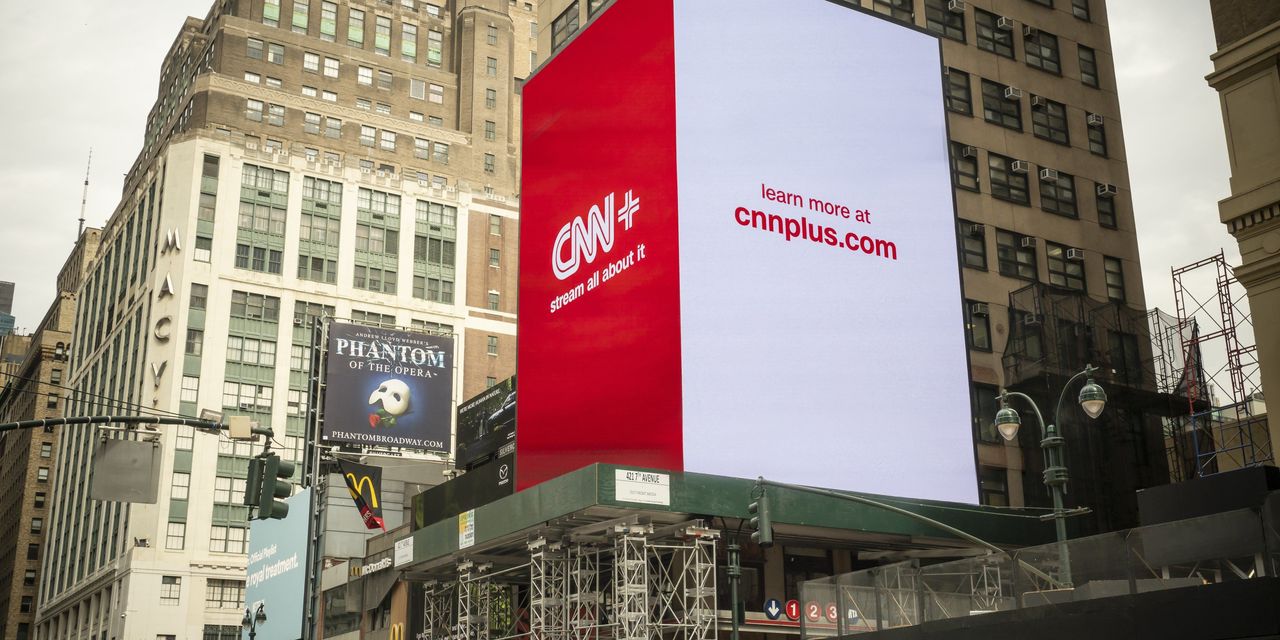
CNN is shutting down its direct-to-consumer streaming service CNN+ about a month after it launched, a remarkably fast reversal that was dictated by the network’s new owners.
In a memo to staff, incoming CNN Chairman and Chief Executive Chris Licht, who hasn’t even officially assumed his role yet, told staffers of the decision on Thursday morning. Andrew Morse, the executive in charge of the service, is leaving the company, Mr. Licht said.
“While today’s decision is incredibly difficult, it is the right one for the long-term success of CNN. It allows us to refocus resources on the core products that drive our singular focus: further enhancing CNN’s journalism and its reputation as a global news leader,” Mr. Licht said in a memo reviewed by The Wall Street Journal.
The move to close the service on April 30 comes just days after CNN’s parent company WarnerMedia was taken over by Discovery Communications. Discovery’s executives were dubious about the strategy of the service even before its deal to acquire the company closed, according to people familiar with the company’s thinking.
CNN’s previous regime, with backing from former WarnerMedia CEO Jason Kilar, spent $300 million on developing CNN+ with plans of investing another $750 million in the next few years, people familiar with the operation said. CNN wooed big-name talent, including Fox News anchor Chris Wallace, to join the service.
Some of the content from CNN+ will move to other platforms at parent Warner Bros. Discovery Inc., WBD -8.11% Mr. Licht told staff in his memo. The HBO Max streaming service is a likely landing spot for some of that content, a person familiar with the matter said.
CNN+, which was launched on March 29, wasn’t met with enthusiasm in the marketplace and had fewer than 100,000 subscribers, the person said. Its $5.99-a-month price was seen as prohibitive by Discovery executives and some CNN insiders, the person said. The majority of the content wasn’t live news, but mostly softer fare such as Mr. Wallace’s interview shows where he often chatted with long-time celebrities such as William Shatner and Joan Collins.
Because of its relationships with pay-TV distributors, CNN was limited in the amount of live news and content it could put on its CNN+ platform. Without the urgency of breaking news, the site was seen as a tough sell by Discovery executives, who would rather invest more in the channel and its existing online platform, the person said.
The decision to shut down CNN+ “is in line with [Warner Bros. Discovery]’s broader direct-to-consumer strategy,” Mr. Licht told staff in his memo. “In a complex streaming market, consumers want simplicity and an all-in service, which provides a better experience and more value than stand-alone offerings.”
David Zaslav, the chief executive of Warner Bros. Discovery, said at a town hall meeting last week that he would rather have all the content from the sprawling entertainment and news company under one platform rather than launching individual services for various channels.
Rival Fox News’ Fox Nation has more than one million subscribers, a person familiar with that operation said. But Fox News is also known for a very loyal audience, and the service offers both entertainment fare as well as content from some of its biggest names including Tucker Carlson. Fox News owner Fox Corp. and Wall Street Journal parent share common ownership.
Even within CNN, there was confusion about the strategy behind CNN+, producers and reporters there said.
Mr. Licht said CNN executive Alex MacCallum would oversee CNN’s digital operations. A CNN veteran with previous stints at the New York Times and Washington Post, Ms. MacCallum was most recently general manager of CNN+ and head of product for CNN Worldwide.
Write to Joe Flint at joe.flint@wsj.com
Copyright ©2022 Dow Jones & Company, Inc. All Rights Reserved. 87990cbe856818d5eddac44c7b1cdeb8








